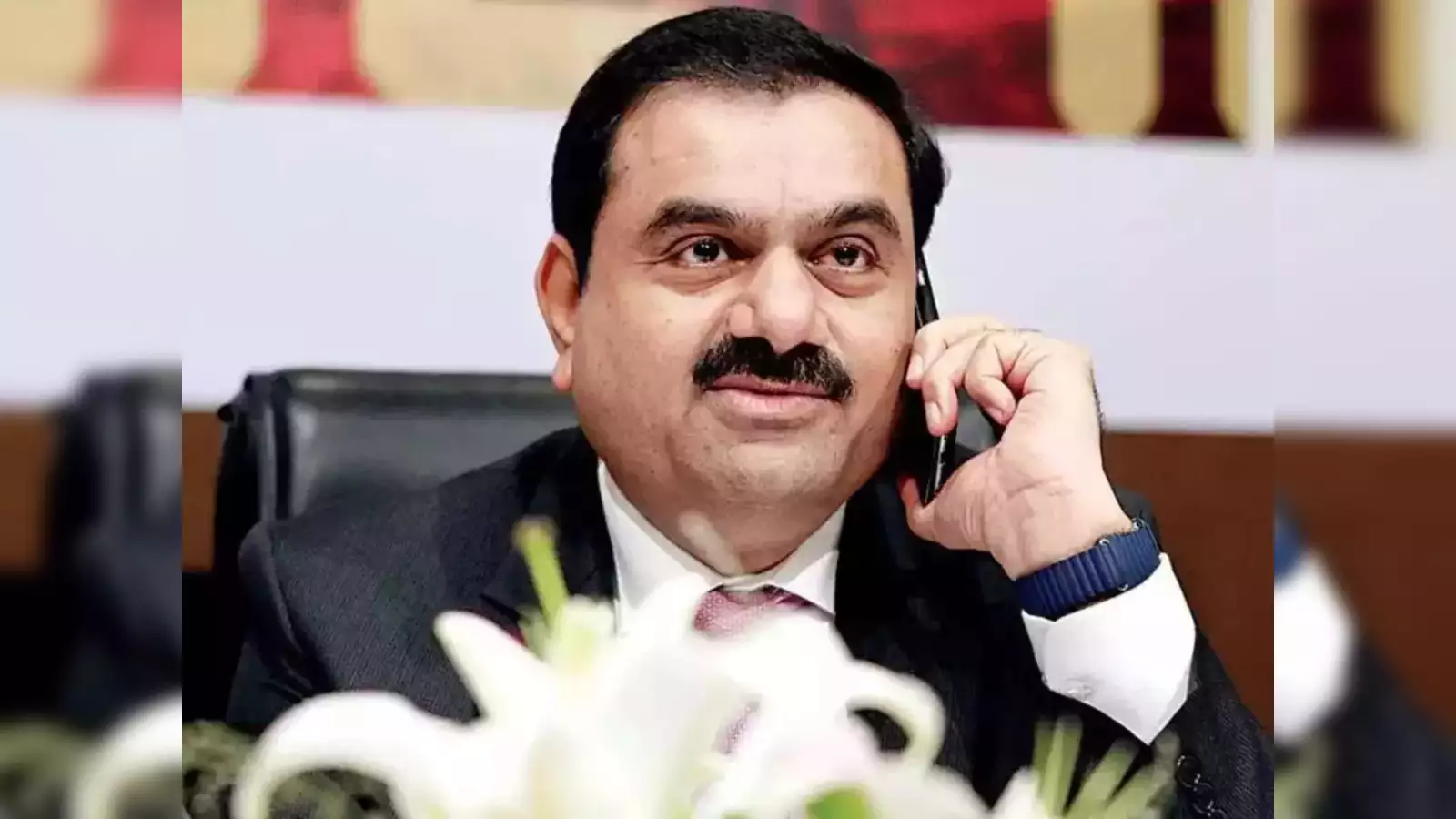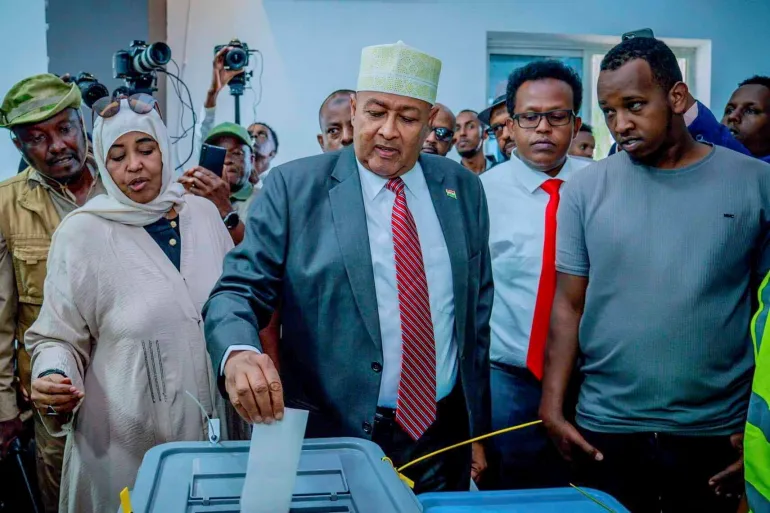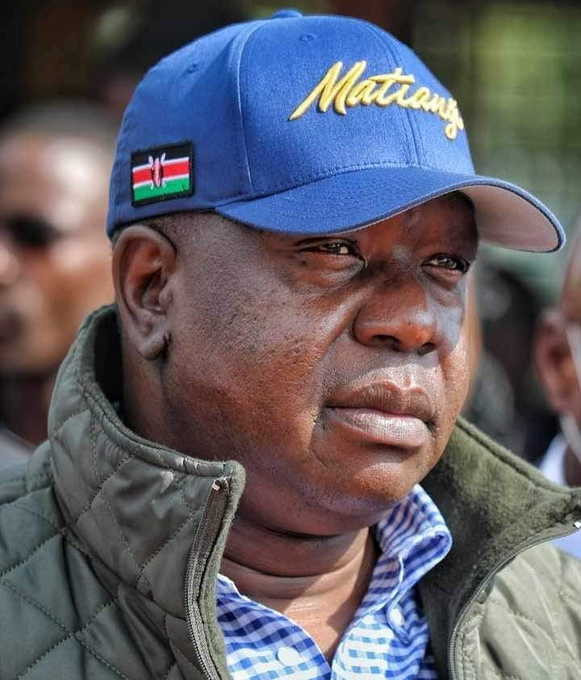Politics
Kenyans stand to lose from Adani airport deal: finance guru explains why.
For Adani Group to achieve this enviable outcome, the Kenyan Airports Authority would have to take a higher risk by accepting a concession fee that fluctuates with the project’s performance while Adani’s cash flows are predetermined by its desired profit.

By Prof Odongo Kodongo
The proposal submitted early this year by Indian conglomerate Adani Group to Kenya Airports Authority to develop and renovate parts of Jomo Kenyatta International Airport has recently been made public.
To facilitate informed public engagement with the proposal, as a project finance student, I thought it would be useful to provide an expert view on its key technical aspects.
Adani exploits a provision in Kenya’s Public Private Partnerships Act of 2021 that allows private companies to initiate project proposals and channel them to the government for consideration.
Briefly, Adani seeks to run Jomo Kenyatta International Airport via a 30-year build, operate and transfer arrangement. Under this arrangement, ownership of the airport remains with Kenya Airports Authority, known as the deal sponsor. The airport business is handled by Adani’s subsidiary, Airports Infrastructure Plc, called the special purpose vehicle.
- Airports Infrastructure Plc, which was registered in Nairobi on 31 August 2024, is fully owned by the United Arab Emirates incorporated Global Airports Operator LLC.
- Global Airports Operator is a subsidiary of Adani Airports Holdings Limited of India, which in turn is fully owned by Adani Group.
The proposal omits information on Adani Airports Holdings Limited’s extent of ownership of Global Airports Operator. This leaves room for speculation about Global Airports Operator’s beneficial owners.
The proposal shows that the project requires a cash outlay of US$2.05 billion including capital expenditures, operating expenses and financing costs. This cost is spread over the project’s development period of about 25 years.
However, my examination identifies important flaws in the structure of the proposed deal.
Airport’s cash flows
The first flaw is that the Adani Group, the project operator, will have access to all of the airport’s cash flows. This should not be the case in a typical private public partnership deal like the one proposed.
In such deals, the project operator should only have access to cash flows generated by the new project – that is, the proposed new terminal building and runway and their associated infrastructure. It should not have access to cash flows from the existing assets and operations of the deal sponsor.
Secondly, the proposal shows that the proposed renovation of the existing terminal buildings will be financed from money generated from the airport’s existing operations. The renovations should therefore be undertaken by Kenyan Airports Authority and not included in Adani’s proposed deal. Including them in the deal would complicate cash flow separation and risk sharing.
To be sure, in instances where there are substantial risks associated with the new project’s capacity to generate cash flows, the project operator might require additional guarantees. In such cases, governments often provide guarantees limited to a small proportion of the required cash flows.
The third flaw is that Adani proposes that the government pay it for the developed assets when the partnership ends. This is wrong: the government must not buy assets that it already owns.
Guaranteed return on investment
There are other provisions that require further scrutiny, as well.
The revenue sharing model proposes a fixed concession fee of US$47 million to the government in 2025. Thereafter, the government would receive a fixed fee plus a variable component calculated to ensure that Adani earns an 18% internal rate of return on its capital investment in the project. Internal rate of return is the average annual profit earned by a project in its lifetime.
For Adani to achieve this enviable outcome, the Kenyan Airports Authority would have to take a higher risk by accepting a concession fee that fluctuates with the project’s performance while Adani’s cash flows are predetermined by its desired profit.
This is neither fair nor equitable risk-sharing. As the project operator and major equity capital provider, Adani must take responsibility for the project’s performance by accepting greater fluctuation in its cash flows.
Affordability of services
Fees for aeronautical services (what airlines pay Adani for using the airport) for the first three years will be determined by the need for Adani’s 18% profit. This is problematic.
The internal rate of return is derived from cash inflows and outflows over the project’s lifetime.
Therefore, to determine user charges for an isolated period of the contract such that the internal rate of return remains fixed would push those fees to very high levels.
Indeed, Adani’s own calculations show that the proposed user charges would make the Jomo Kenyatta International Airport more expensive than the Bole International Airport in Addis Ababa. For some transport corridors, the Nairobi airport’s charges as a proportion of airfares are more than double Bole’s.
Passenger traffic
Adani’s project proposal is flawed when it comes to passenger traffic too.
First, the agreement assumes what it calls a “meteoric surge” in passenger numbers based on an assumed constant annual growth rate of 4.5%. This is too optimistic relative to the airport’s historical performance.
Second, Adani’s projections assume full capacity use over the 30-year period. Any financial modeller knows that full capacity is difficult to achieve.
Overall, because of the long period of projections and optimistic stance, Adani’s forecasting assumptions should be subjected to rigorous stress testing (sensitivity analysis). This has not been done.
Tax holidays
Carefully tucked away in the project’s feasibility report is an unheralded pitch to the government for a tax holiday if Adani wins the tender.
Adani argues that, if granted, a tax holiday would lower the charges to airlines. In my view, this is the proposed project’s deal breaker.
Kenyan policy does allow for tax holidays of various kinds to incentivise capital formation and investments in critical but unattractive sectors. It’s doubtful that the airport business fits this description and therefore merits such an incentive.
Further, the evidence shows that such tax incentives hardly offer meaningful economic growth benefits to African countries. More importantly, an analysis of the proposed tax holiday’s effect on cash flows should be provided to aid its assessment. Adani omits such an analysis.
The land question
A component of Adani’s strategy involves developing and operating facilities, such as offices and convention centres. This is subject to confirmation of land availability. Adani does not propose to buy the land. Rather, it appears that Kenya Airports Authority would have to provide the land.
This begs several clarifications.
If the Kenya Airports Authority owns the land, the opportunity cost of the land utilisation by Adani needs to be incorporated in the cost-benefit analysis.
If the Kenya Airports Authority has to buy the land, the question becomes that of the source of the purchase money and whether land acquisition would be the best use of that money by an authority seeking to outsource tasks, such as renovations, due to cash flow constraints.
Final thoughts
The Public Private Partnerships Act requires a justification when an open tender approach is not used for a proposed project. That this has not been done is worrying, given that the consultant hired by the government to advise on this transaction recommended open tendering.
Adani’s argued benefits of its privately initiated proposal – quicker turnaround time, customisation, and risk mitigation – are not convincing. Such benefits are better realised through an open tender, which provides additional benefits such as competitive pricing and transparency.
Adani labelled its proposal “private and confidential”. It is reasonable to expect that it signed a non-disclosure agreement with Kenya Airports Authority to protect its submission from leaking to potential competitors. The proposal has now been released and its content is open knowledge.
If the government were to stop processing Adani’s proposal and open the tender to all interested investors, Adani might seek legal redress since its competitors would easily design their bids to beat its own. Any unbiased court will find that the “breach of confidentiality” violates Adani’s rights.
Adani will win the suit.
One way or the other, circumstances now make Adani the winner and Kenyans the loser in this fiasco.
Keywords:Public-Private Partnerships:Adani Group:Jomo Kenyatta International Airport:Build-Operate-Transfer:Tax Holiday
The story initially ran @ https://theconversation.com/kenyans-stand-to-lose-from-adani-airport-deal-finance-guru-explains-why-239848
Politics
Martha Karua’s Memoir: A Journey of Leadership and Resilience

: Discover Martha Karua’s memoir, Against the Tide, as she reflects on her
political career, struggles, and triumphs in Kenya’s fight for justice and
leadership.
Martha Wangari Karua, born on September 22, 1957, in Kirinyaga District, launched her
memoir, Against The Tide, on Sunday, November 17, 2024.
This memoir, the culmination of nine years of writing, offers an insightful and personal
look into Karua’s remarkable journey as a lawyer, activist, and politician.
Known for her staunch advocacy for justice, tireless efforts against corruption, and bold
leadership, Karua has become one of Kenya’s most respected political figures.
“Writing this book has been a labour of love; the love I have for my country
and its people, the struggles I have endured, and the unwavering
commitment to building a better Kenya,” Karua shared at the launch,
reflecting on the challenges and triumphs that have defined her career.
A Curious Childhood and Early Inspirations
Growing up in Kimunye village, Karua’s inquisitiveness often led her to challenge the
status quo. Despite being a source of concern for her parents—both teachers—her
curiosity became the foundation of her intellectual pursuits.
“My close family had been supportive and patient, my dad and teachers
exhibited patience with me,” Karua recalls.
Her father, a prominent figure in her early life, sparked Karua’s interest in law,
particularly after she accompanied him to court as a child and became fascinated by the
respect magistrates commanded.
“When I was in primary school, I accompanied my dad to court on a traffic
matter. We had gone to Kerugoya, then we passed by the court. I liked the
attention the magistrate was getting, and upcountry they were being called
‘Judge,’” she explains.
Karua’s education at Nairobi Girls’ School fostered her independence, where she was
encouraged to express her opinions freely—a crucial factor in the development of her
leadership qualities.
Political Awakening
Karua’s political activism began within the Law Society of Kenya (LSK), where she and
other members challenged government excesses. This marked the beginning of her
deep commitment to national change.
“I realised that just as I had in the law society activism, it’s not enough to
complain about what is not being done.
It’s also important to get there and do what you think should be done. I was
seeking to be a part of the solution,” she explained.
Her decision to join active politics in 1992 led to her election as the Member of
Parliament (MP) for Gichugu, a position she held for four terms.
This transition marked her rise to national prominence, where she became renowned
for her principles, adherence to the rule of law and advocacy for women’s rights. Over
time, her steadfast nature earned her the nickname “The Iron Lady.”
From Law School to Legal Practice
Karua’s passion for law drove her to the University of Nairobi, where she earned her law
degree in 1980 and was admitted to the bar in 1982.
At just 24 years old, she began her career as a magistrate. However, financial
constraints led her to private practice in 1987, where she grew her firm, Martha Karua &
Co. Advocates, and advocated for human rights during Kenya’s politically turbulent
years under President Daniel arap Moi.
“When I entered the judiciary as a magistrate, I was earning Sh3,000. When
I got a family, the salary was not good enough,” Karua explains.
Her work in public service and private practice led to her being conferred Senior
Counsel 38 years later, following a career marked by significant legal accomplishments.
A Pivotal Role in the 2007 Election Crisis
In her memoir, Karua recounts the dramatic aftermath of the 2007 elections, when the
Electoral Commission of Kenya declared Mwai Kibaki the winner amid accusations of
fraud.
Despite widespread protests from the opposition, led by Raila Odinga, Karua took
immediate action to ensure Kibaki was sworn in.
The swearing-in ceremony, held on December 30, 2007, took place at State House,
Nairobi, despite the chaotic situation.
“The swearing-in had to be done immediately. Kibaki was declared the winner, and
according to the Inter-Parties Parliamentary Group (IPPG) amendment, the President
was to be sworn in as soon as he was declared,” Karua explained.
The action was necessary, she asserted, to maintain order during a tense political
period.
“How else could the swearing-in have been conducted? It was vital to swear
him in immediately,” she added.
Despite the political turmoil, Karua stands by her decision:
“I did what was right, and I stand by that decision. Even tomorrow, I will do
what is right. I have no regrets about the role I played as Kibaki’s agent and
the vote I cast for him,” she said.
However, the aftermath of the election saw post-election violence, which led to tribal
clashes, destruction, and loss of life. Karua expressed regret for the violence that
followed:
“We regret the loss of life, the destruction of property, and the displacement
of people. We also regret our failure as leaders, which could have led the
country into an abyss.”
Lessons from Leadership and Regrets
In her memoir, Karua reflects candidly on her political journey, including her decision to
run for president in 2012, which she now considers a misstep.
“The people of Gichugu elected me. I believe if I had gone for the
parliamentary seat instead of the presidency in 2012 or any local seat, I
would still be elected. I had bitten more than I could chew,” she admits.
Despite the loss, Karua stands firm in her principled approach to politics, particularly
during the constitutional review under President Mwai Kibaki’s administration.
“The issue of refusing to anchor the agreement in the Constitution was
pivotal. Kibaki wanted to accommodate Raila and his group in government
but still retain the ability to appoint and fire just like before. However, Raila and his group, having been fired in 2005, wanted it enshrined in the Constitution,” she explains.
A Legacy of Resilience
Karua’s story is not just one of triumph, but also resilience in the face of adversity,
including losses and betrayals. Reflecting on her journey, she writes:
“Thirty-eight years later, I was conferred to the rank of Senior Counsel
following an illustrious career in public service and private practice,
successfully arguing cases that have set legal precedence. It has not been
easy. I have faced each tide that has come my way and overcome.”
Against The Tide: A Testament of Courage
This memoir, which took nearly a decade to complete, stands as a testament to Karua’s
unwavering resolve to confront challenges head-on.
For anyone seeking inspiration from one of Kenya’s most iconic leaders, Against The
Tide offers a story of resilience, leadership, and the relentless pursuit of justice.
“Against The Tide is about overcoming adversity. It’s about resilience,”
Karua declared.
Politics
Somaliland Elects Opposition Leader Irro as New President

:Abdirahman Irro wins Somaliland’s 2024 presidential election with 64% votes,
signalling change. Over 1M registered voters participated peacefully
Somaliland’s presidential election, held on November 13, 2024, resulted in a decisive victory for Abdirahman Mohamed Abdullahi Irro of the Wadani Party.
Preliminary results indicated that Irro received approximately 64% of the votes, with Muse Bihi Abdi, the incumbent president from the Kulmiye Party, trailing at 35%.
The third candidate, Faysal Ali Warabe of the UCID Party, garnered less than 1% of the votes.
This election, initially scheduled for 2022, faced delays due to economic and political challenges but proceeded peacefully with over 1 million registered voters participating in over 2,000 polling stations.
Key Issues and Electoral Dynamics
The election was a referendum on governance, with voters expressing dissatisfaction with Muse Bihi Abdi’s administration, particularly regarding economic stagnation, rising unemployment, and issues of democratic space.
Irro’s Wadani Party campaigned on promises of economic reforms, improving international
recognition for Somaliland, and fostering greater inclusivity in governance.
Voter Turnout and Observations
Despite logistical challenges, approximately 680,000 voters cast their ballots. Observers from
ten nations praised the National Electoral Commission (NEC) for conducting a transparent
process.
No major security incidents were reported, showcasing Somaliland’s commitment to democratic principles.
Significance of the Win
Irro’s victory marks a significant shift in Somaliland’s political landscape.
As the leader of the opposition, his administration is expected to focus on addressing
longstanding economic and social grievances while seeking greater international legitimacy forSomaliland, which has remained diplomatically isolated since declaring independence in 1991.
The peaceful transfer of power further reinforces Somaliland’s reputation as a beacon of
democracy in the Horn of Africa The official results are expected to be announced by November 21, 2024, cementing Irro’s position as Somaliland’s new
Politics
Fred Matiang’i Hires Canadian Firm Dickens & Madson for 2027 Bid

: Fred Matiang’i partners with Dickens & Madson for $250K to boost his 2027
presidential campaign, focusing on lobbying and strategic global support.
Former Kenyan Interior Cabinet Secretary Fred Matiang’i has taken a bold step toward the 2027 presidential race by hiring Canadian lobbying firm Dickens & Madson. The firm, led by
controversial political consultant Ari Ben-Menashe, signed an agreement with Matiang’i on July 13, 2024. The deal reportedly involves a $250,000 (about KSh 32 million) fee, covering services designed to build international support for Matiang’i’s political ambitions over the coming years.
Scope of Services
Dickens & Madson is tasked with lobbying influential governments, including the U.S., U.K., and Japan, and international organisations to align them with Matiang’i’s bid. Their deliverables also include formulating strategies to enhance his political campaign and improve his global image.
This approach mirrors the firm’s previous engagements, where they used diplomatic channels to influence policies and secure favourable positions for their clients.
Previous Work
The firm is no stranger to high-profile and often controversial political campaigns. It has worked with Zimbabwean President Emmerson Mnangagwa to promote land deals and improve Zimbabwe’s international standing. Dickens & Madson’s client portfolio also includes various governments and individuals facing sanctions or international scrutiny, highlighting their reputation for navigating complex geopolitical terrains.
Implications for 2027
Matiang’i’s decision to engage a firm with such a record underscores his intention to leverage
international networks to counter President William Ruto’s administration.
While the move signals strategic ambition, it also invites scrutiny, given the firm’s controversial history and the polarised perception of Matiang’i’s leadership legacy This development sets the stage for a high-stakes election, as Matiang’i aims to position himself as a credible alternative to Ruto, drawing on both local and international support to bolster his campaign.
-

 Business & Money8 months ago
Business & Money8 months agoEquity Group Announces Kshs 15.1 Billion Dividend Amid Strong Performance
-

 Politics2 months ago
Politics2 months agoFred Okengo Matiang’i vs. President William Ruto: A 2027 Election Showdown
-

 Politics2 months ago
Politics2 months agoIchung’wah Faces Mt. Kenya Backlash Over Gachagua Impeachment Support
-

 Politics4 months ago
Politics4 months agoPresident Ruto’s Bold Cabinet Dismissal Sparks Hope for Change
-

 Politics5 months ago
Politics5 months agoKenya Grapples with Investor Confidence Crisis Amid Tax Protest Fallout
-

 Politics5 months ago
Politics5 months agoPresident Ruto’s Lavish Spending Amid Kenya’s Economic Struggles Sparks Outrage
-

 Politics3 months ago
Politics3 months agoJohn Mbadi Takes Over Kenya’s Treasury: Challenges Ahead
-

 Business & Money1 week ago
Business & Money1 week agoMeet Kariuki Ngari: Standard Chartered Bank’s new CEO of Africa. What’s Next?





